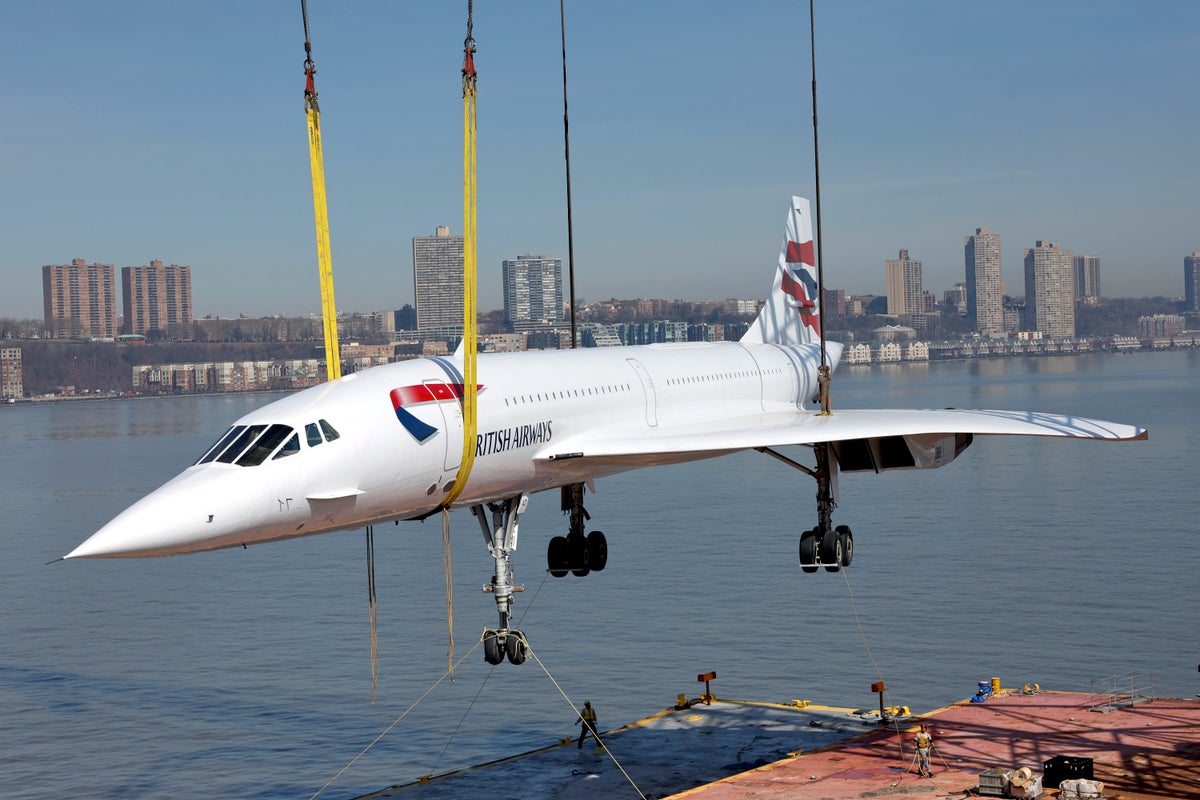Lawmakers Push to Legalize Emissions-Heavy ‘Supersonic’ Planes
A bill to repeal the ban on supersonic flights over the U.S. could increase the demand for the gas-guzzling jets from around a dozen to as many as 240
The Concorde, seen above as it is returned to the Intrepid Museum last year, was last in commercial operation in 2003. Lawmakers want to help bring back supersonic flights by legalizing it in U.S. airspace, as United Airlines and others invest in the planemaking startup Boom Supersonic.
Michael M. Santiago/Getty Images
CLIMATEWIRE | Lawmakers on both sides of the Capitol are seeking to repeal a half-century-old regulation that prevents civilian aircraft from traveling faster than the speed of sound over the United States.
The “Supersonic Aviation Modernization Act” could vastly increase the potential market — and emissions — of Boom Supersonic, a planemaking startup backed by United Airlines; Japan Airlines; and Sam Altman, the billionaire CEO of the artificial intelligence firm OpenAI.
No commercial supersonic planes have been in operation since the Concorde ceased flights between New York and London in 2003. But aviation analysts estimate that the jets Boom is developing would consume at least two times more fuel per passenger than flying on commercial airplanes in operation now.
On supporting science journalism
If you’re enjoying this article, consider supporting our award-winning journalism by subscribing. By purchasing a subscription you are helping to ensure the future of impactful stories about the discoveries and ideas shaping our world today.
The bill is from Sen. Ted Budd (R-N.C.), whose state is home to Boom’s manufacturing plant, and Rep. Troy Nehls (R-Texas), the chair of the Transportation and Infrastructure Subcommittee on Aviation. It’s co-sponsored by Republican Sens. Thom Tillis of North Carolina, Mike Lee of Utah and Tim Sheehy of Montana as well as Democratic Rep. Sharice Davids of Kansas.
“Supersonic flight without an audible sonic boom should obviously be allowed,” said Blake Scholl, Boom’s founder and CEO, in statements released by the bill’s lead sponsors. “I urge Congress to pass the Supersonic Aviation Modernization Act supersonically, so we can all enjoy faster flights and maintain American leadership in aviation.”
The legislation would order the Federal Aviation Administration to scrap or update a 1973 regulation that prohibits non-military-related supersonic flight over the U.S. within a year of the bill’s passage. It specifically calls for the agency to allow for civilian flights in the national airspace “at a Mach number greater than 1 so long as the aircraft is operated in such a manner that no sonic boom reaches the ground in the United States.”
The congressional push to undo the overland flight ban comes as NASA prepares to conduct its first test flights of a supersonic jet developed by Lockheed Martin to produce sonic “thumps,” rather than booms, when traveling faster than the speed of sound. The United Nations’ International Civil Aviation Organization is also set to develop new noise standards that member states could adopt.
In February, Boom completed a series of supersonic test flights in a prototype plane that it claimed did not produce sonic booms that were audible from the ground. The speed of sound, or Mach 1, varies based on atmospheric conditions but is generally around 767 mph at sea level.
The following month, Scholl visited Washington to lobby Trump administration officials to repeal the supersonic flight ban, POLITICO Pro reported at the time.
The International Council on Clean Transportation, an environmental research group, estimated in 2022 that dropping overland flight prohibitions for supersonic aircraft in the U.S. and other major markets could increase the demand for the gas-guzzling jets from around a dozen to as many as 240. The company has already reported inking deals with airlines to produce 130 planes.
Boom is designing its engines to run on sustainable aviation fuel, which has a fraction of the carbon emissions of traditional jet fuel. But operating the supersonic jets with SAF would be uneconomic for most airlines given the higher cost of SAF and the greater fuel consumption required to break the sound barrier.
Reprinted from E&E News with permission from POLITICO, LLC. Copyright 2025. E&E News provides essential news for energy and environment professionals.

